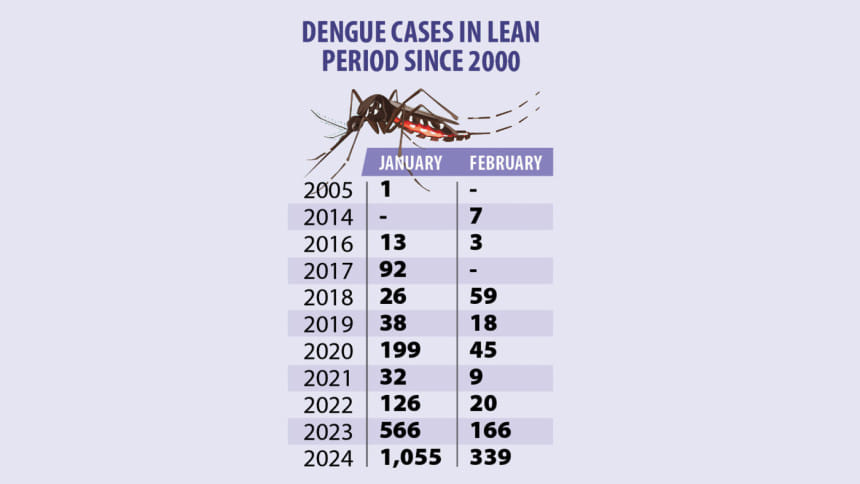Dengue meanest this lean period

The number of dengue cases recorded this January and February is higher compared to the first two months of the previous 23 years, raising the spectre of another deadly outbreak of the mosquito-borne disease.
The total number of cases logged in January and February this year was 1,454 and that of deaths was 17.
Till March 7, the cases rose to 1,455 and deaths to 18.
Experts fear the number may rise further in the months to come if effective steps are not taken to contain the menace.
According to the Directorate General of Health Services (DGHS), 1,055 dengue cases and 14 deaths were recorded this January, and 339 cases and three deaths in February.
Last January, the numbers of cases and deaths were 566 and six. Last February, they were 166 and three.
The country saw the first dengue outbreak in 2000, when 5,551 cases and 93 deaths were recorded. Last year, the total number of cases was 3,21,179 and deaths 1,705.
According to DGHS data, since 2000, outbreaks took place in 11 separate years, including 2024.
One dengue case was recorded in January 2005, 13 in January 2016, 92 in January 2017, 26 in January 2018, 38 in January 2019, 199 in January 2020, 32 in January 2021, 126 in January 2022 and 566 in January 2023.
Meanwhile, seven dengue cases were recorded in February 2014, three in February 2016, 59 in February 2018, 18 in February 2019, 45 in February 2020, nine in February 2021, 20 in February 2022 and 166 in February 2023.
No dengue cases were recorded in the years apart from the aforementioned ones.
Entomologist Manzur A Chowdhury said it is alarming that the number of cases and deaths in these two months is almost double compared to January and February of last year. "However, this is the lean period and it is the right time to take effective measures to stop the number from getting any higher."
The authorities concerned, he said, have to identify Aedes mosquito clusters – localities with active transmission -- by collecting the addresses of the patients currently suffering from the infection.
"Identifying clusters is very important during the lean periods to control dengue as during this time it is easy to find clusters and neutralise them. But when it spreads during the rainy seasons, it becomes very tough to control."
Conducting anti-mosquito drives by using larvicide and adulticide, along with cleanliness drives and awareness campaigns in the identified localities, is a necessity now, he said, adding that unfortunately there is no sign of such efforts yet.
"The patients also need to be kept under mosquito nets so the virus doesn't spread through them."
Manzur added, "There is no surveillance being done to recognise the serotypes of dengue and chikungunya [diseases carried by the Aedes mosquito], which is also very important to control the diseases."
Prof Kabirul Bashar, an entomologist at Jahangirnagar University, said the number of dengue cases is high in Dhaka, Chattogram, Barishal, Barguna and Pirojpur this year, as per their findings.
"However, the numbers of patients are higher outside the capital and we fear they would be the highest since 2000."
Bashar, who conducted a survey with a team of his university, said, "We are finding Aedes larvae in high densities outside Dhaka, and this is one of the main causes of dengue cases being at an all-time high this year.
"In many areas outside Dhaka, dengue cases are being recorded for the first time, meaning the people in those areas are less immune to the disease compared to people in Dhaka. This is another reason for such high number of cases this year. At least half the population in the capital have been previously infected and so, have antibodies to resist the infection the second time around."
He said it is imperative for the government to direct the authorities of all districts, upazila parishads and union parishads, along with deputy commissioners to take necessary measures from now.
"They will have to identify the possible breeding sources and destroy those through the cleaning activities soon."
Meanwhile, the government will have to provide adequate logistics and budget for anti-mosquito drives, especially for areas that have no such activity going on yet, he said, adding, "Basic dengue treatment facilities will have to be established in all areas, including districts that have none available."

 For all latest news, follow The Daily Star's Google News channel.
For all latest news, follow The Daily Star's Google News channel. 



Comments